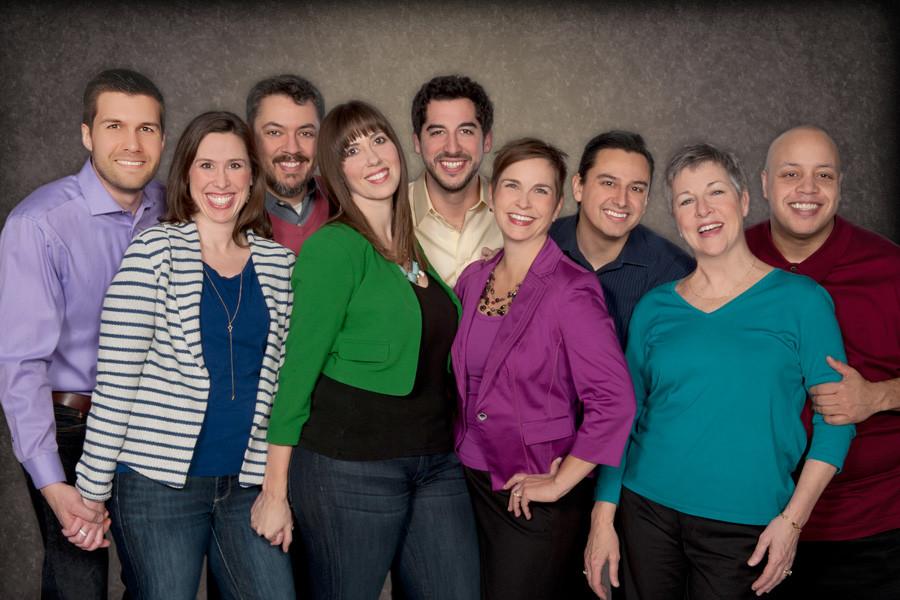Chicago a capella group performs Shakespeare’s words in song
A capella singers in Chicago a cappella will be performing a program of pieces based on Shakespeare’s plays and sonnets. Their performance is part of Shakespeare 400 Chicago, a celebration of Shakespeare’s death that involves 850 performances around the Chicago area in the next year.
February 11, 2016
A&E
Audience members at “Shakespeare a capella” in Evanston this weekend will be transported back 400 years to the streets of London to learn life lessons from Shakespeare’s works.
Nine singers from Chicago a capella, an a capella group with an eclectic repertoire that includes two Northwestern alums, will bring “Shakespeare a capella,” a performance of choir pieces based on Shakespeare’s plays and sonnets, to Nichols Concert Hall, 1490 Chicago Avenue.
The performance is part of the Shakespeare 400 Chicago festival. The year-long festival that began in January, organized by Chicago Shakespeare Theater, will bring 1,000 artists together in different events throughout the Chicago area to observe the 400th anniversary of Shakespeare’s death.
“This is so exciting because Shakespeare’s words are so rich and so deep and for hundreds of years composers have been inspired by Shakespeare,” said Jonathan Miller, founder and artistic director for Chicago a capella. “We have a love song, we have a fierce song, we have somber meditations on death … any song that makes it has to have a particular quality that just reaches out and grabs you.”
Miller first started putting together “Shakespeare a capella” in 2003 when he put out a calling for music based on Shakespeare’s texts that had been written in the past 25 years, he said. He received music from all over the world, including pieces that had been composed specifically for “Shakespeare a capella,” he said.
The final repertoire consists of more than 15 pieces, each of which illuminates a different aspect of Shakespeare’s sonnets, he said. Often, composers will take parts of a play that call for music and create their own melody for Shakespeare’s words, he added.
This weekend’s performance differs from Chicago a capella’s regular performances in that two actors from Chicago Shakespeare Theater, Barbara Robertson and Greg Vinkler, will perform monologues in between choral performances to create transitions and illuminate what each song is about.
“It has really brought an element of worth and humanity and playfulness, so Barbara and Greg
will make the emotions in the song that we’re singing more readily available to touch people’s hearts,” Miller said.
Emily Price (Bienen ‘02), a mezzo-soprano in the show, said the actors’ lines in between songs will create a longer arc to the performance because the pieces will be more drawn out, as opposed to having applauses in between each number.
She added this will create a more dramatic element on stage than most of the group’s normal programs, and it will also give the performers more energy.
“It feeds the characterization and keeps the mood suspended,” she said.
As part of the Shakespeare 400 Chicago festival, the performance will help emphasize the different ways Shakespeare can be interpreted and the relevance of Shakespeare’s plays and sonnets in today’s society, festival producer Doreen Sayegh said. She added throughout the year-long festival, artists will emphasize these themes through the use of different mediums including theatrical performances, music and food.
“It’s interesting to see how different genres interpret the plays and use them to convey human messages,” she said. “It’s why we’re still excited by these texts 400 years later, because these stories ring true across generations, across disciplines.”
Sayegh said organizers are expecting the festival to reach more than 500,000 people. She added she thinks Shakespeare really resonates with the city of Chicago.
“You see how his works, his command of grit and endurance and human passion, lives in the way Chicago takes itself as a city,” she said. “Everyone has been affected by Shakespeare in one way and I think there’s real life for Shakespeare in Chicago.”
Email: [email protected]
Twitter: @emchin24


